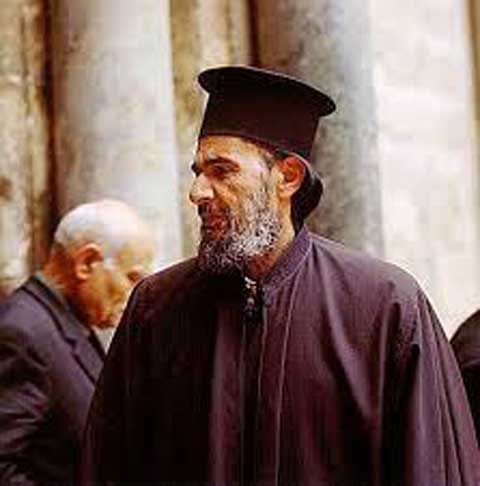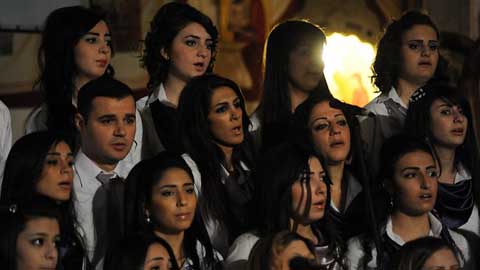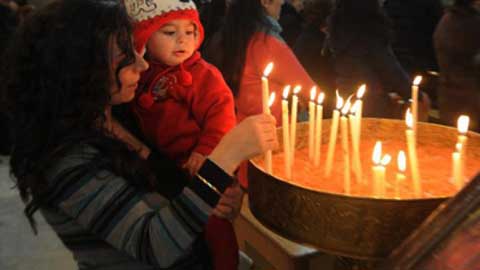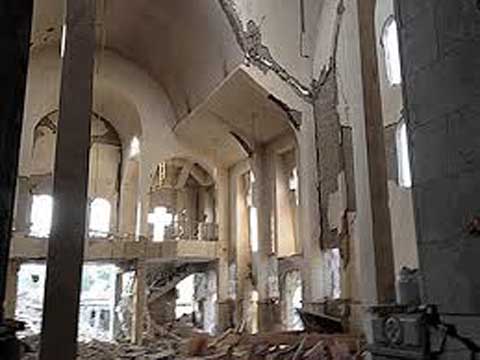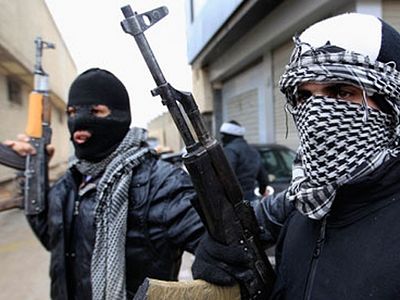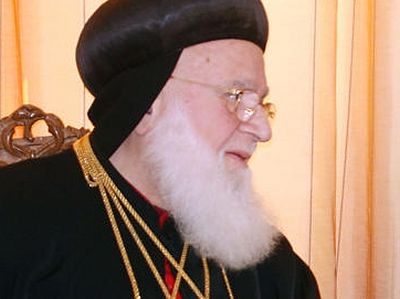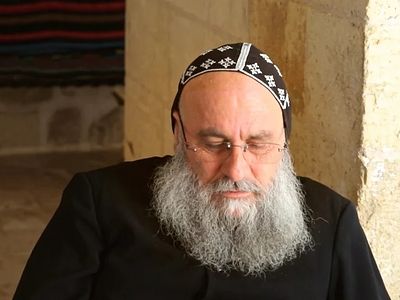Towns and villages in Syria that have been home to Christians for 2,100 years are being steadily emptied as families flee persecution, the deadly violence of a civil war, fears of chemical warfare and a rash of targeted kidnappings in which Christian leaders have been held for large ransoms.
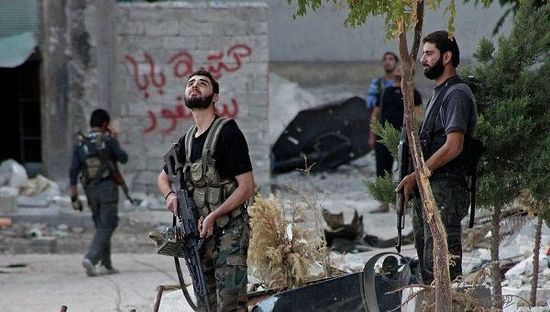
But some are staying – declaring they are called to be lights in the darkness.
“Since the civil war in Syria began, Christians have increasingly suffered attacks from radical Islamists,” reports International Christian Concern. “In the past 18 months, a staggering 2 million Syrians have fled their country to seek refuge in neighboring countries. Syrian Christian leaders are asking for our help for those Christians who have fled. Unable to work, they are desperate. Help is necessary to sustain the families and very little aid has come to them so far.”
Life is even more difficult for those who have chosen to stay. At least a third of the Christians in northeastern Syria are believed to have fled – after centuries of relative peace.
“It breaks my heart to think how our long history is being uprooted,” Syriac Christian leader Ishow Goriye, told Ruth Sherlock, of the British newspaper the Daily Telegraph reporting from the Syrian area of al-Hasakah.
He is among Syriac Christians who say they are determined to stay – because of their high calling to be living witnesses of Christ’s love, mercy and grace – no easy assignment in the middle of a multi-sided civil war between zealous extremists.
Syria’s Orthodox congregations have for centuries proudly claimed to be the most ancient in the world. Shortly after Christ’s crucifixion, a zealot named Saul led an expedition into Syria, intending to bring fugitive Christians back to Jerusalem to be tried for apostasy.
Instead, on the road to Damascus – still today Syria’s capital – he had a dramatic experience and was transformed into the missionary who spread the Gospel throughout the known world and authored 14 of the New Testament’s 27 books.
According to St. Luke writing in Acts 11:26, “The disciples were first called Christians in Antioch” in Syria – now Antakya, just across the border inside Turkey. Syria was the home of one of the great early leaders of Christianity, St. Ignatius.
Goriye “has watched as Christian families from al-Hasakah pack their possessions on the rooftops of their vehicles and flee their homes ‘with little plan to come back,’ reports Sherlock. “Conflict in the area, desperate economic conditions, lawlessness, and persecution by rebel groups remain the main reasons for why Christian families are fleeing the area.”
But, notes David Curry for the advocacy group Open Doors, “Hidden in the noise of the current political environment is still an unrepresented issue in Syria – the intentional and systematic persecution of Christians. We are calling Christians on all sides of the political debate to dedicate themselves to prayer for our fellow believers who are targeted for their faith.
“They’ve done nothing wrong, only being bold enough to associate themselves as Jesus followers” – not an easy assignment in the middle of a firefight between jihadists.
“Please pray earnestly for protection of their lives, families, businesses and freedoms. Without the support of Christians in the West, these believers face even more danger,” reported Curry. “Thousands are already refugees, prisoners, homeless and victims of kidnappings due to this systematic persecution. With the growing marginalization of Christian faith around the world, it is imperative that we unite in prayer.”
“It began as kidnapping for money, but then they started telling me I should worship Allah,” a former kidnap victim told the Telegraph’s Sherlock. “I was with five others. We were tied and blindfolded and pushed down on our knees. One of the kidnappers leant so close to my face I could feel his breath. He hissed: ‘Why don’t you become a Muslim? Then you can be free’.”
Rebel groups presume the Christians support the government – although Goriye’s Christian Syriac Union party has long been in opposition to President Bashar al-Assad’s regime. While speaking to the Telegraph, Christian leader members “were loath to criticize the opposition rebels, but many confessed that the situation had become ‘too bad’ not to talk about it,” reported Sherlock.
“Rebels said we had to pay money for the revolution,” a refugee told the Telegraph. “My cousin is a farmer, and wanted to check on his land. I warned him he should take armed security but he refused. A group kidnapped him in the barn of his farm. We had to pay $60,000 for his release. They are milking the Christians.”
“A few prayer requests from churches inside Syria – ” reported Open Doors, “include lasting peace, counselling for children who have been traumatized by violence, support for almost one-third of the Syrian population who are either refugees outside the country or homeless inside Syria, medicines, food and other relief materials get to those most in need.”
But included in the prayer request was that Christians around the world pray that the Syriac Christians remaining in the war zone “be a salt and light in their community even as civil war rages. “
Much of Syria’s Christian community has avoided “choosing sides” in the war, seeking self-preservation in neutrality, reported Sherlock. “But the strategy has left Christians defenseless in the face of sectarian attacks and the lawlessness that now define rebel-held areas. Last year, when government forces pulled out al-Hasakah province, leaving the terrain in the hands of Kurdish groups and Sunni opposition rebel, Christians became an easy target.
“A Christian man calling himself Joseph and living in al-Hasakah said: ‘The only unprotected group are the Christians. The Arabs had arms coming from Saudi and Qatar, the Kurds had help from Kurdistan. We had no weapons at all.’”
“The deadly violence percolating half a world away in Syria and the warnings of a possible U.S. attack have some people not only looking ahead to what might happen in the coming days — but also looking backward into ancient, apocalyptic prophecies in the pages of the Old Testament,” writes J.D. Gallop in USA Today newspaper.
“In recent weeks, some dire prophecies have turned up on websites, in book stores, as the subject of Bible studies and in sermons by some Christians and others who see a link between the old passages and modern-day events in Egypt, Libya and Syria.”
After all, “Behold, Damascus is about to be removed from being a city, and will become a fallen ruin,” reads Isaiah 17, a passage some Christians say they believe details a horrific event that leaves the city uninhabitable and leads to worldwide tribulation and the second coming of Christ, notes Gallop.
“Another passage in Isaiah 19 deals with civil war in Egypt and the rise of a ‘fierce king.’ Talk of those prophecies has intensified as President Barack Obama considers a U.S. military strike on Syria in response to what Washington says is evidence that the Syrian leadership used chemical weapons against its own people. In turn, Syria vows to retaliate against neighboring Israel if the U.S. strikes.
“Fighting raged through the picturesque mountain village of Maaloula, near Damascus,” reported Sherlock with the Telegraph’s Magdy Samaan, as the regime launched a counter-attack against the rebels.
“They entered the main square and smashed a statue of the Virgin Mary,” said one resident of the area, speaking by phone and too frightened to give his name. “They shelled us from the nearby mountain. Two shells hit the St Thecla convent.”
“Maaloula, tucked into the honey-colored cliffs of a mountain range north of Damascus and on a ‘tentative’ list of applicants for Unesco World Heritage status, is associated with the earliest days of Christianity,” noted the Telegraph.
“St. Thecla, who is supposedly buried in the convent, was a follower of St. Paul. The inhabitants are mostly Melkite Greek Catholic and Orthodox Christians, but have historically lived peacefully alongside a Sunni Muslim minority. It is one of only three places in the world where Western Aramaic, a dialect of the language spoken by Christ, is still used.
“Until recently, the town had managed to remain mostly unaffected by the civil war that has already claimed more than 100,000 lives. A visit by theDaily Telegraph last year found it ringed by government checkpoints but suffering from the lack of pilgrims and tourists who are normally vital to its economy.”
Residents say several rebel groups – a mix of the extremist Jabhat al-Nusra and the more moderate Free Syrian Army, attacked the village.
“First they took a brick factory owned by a Christian guy, who is now missing,” said the resident. “Then at around 5.30 a.m., a car bomb detonated at the checkpoint at the entrance to the village. Some of the rebels entered a home near the checkpoint belonging to Yousef Haddad, a Christian. They tried to force him to convert to Islam.”
A nun living in a convent in the village told the Associated Press that 27 orphans living in the convent were taken to nearby caves for shelter.
How are Christians under such assault supposed to defend their faith? Many cite Jesus in the Garden of Gethsemane who chastised the Apostle Peter for drawing a sword in defense of the Saviour.
Egyptian Christians are under the same pressure – with thousands opting to leave embattled areas rather than join in the fighting on one side or the other.
On Sunday, the news network SAT-7 aired footage of Egyptians worshipping in the remains of the Evangelical Church of Beni Mazar in the town of Minia, Upper Egypt, It was one of over 80 Egyptian churches targeted in violent.
“Dark smears mark where flames licked the outside walls of the church building after arsonists set it ablaze,” reported SAT-7. “The charred hull of the interior is crumbling and peeling where wood and paint previously existed. Singed wiring hangs loose from the ceiling. On 14th August, Rev. Hany Jacque received a phone call notifying him that angry rioters had broken in the door of the church. For seven hours, the rioters stole furniture from inside, broke the glass windows, and burned the church’s books, including its Bibles. They also looted and burned its community services building next door, which had provided medical and financial assistance to all the residents of Beni Mazar, regardless of their religion.”
On camera, Jacque reflected on the destruction, “The Church is not walls and buildings. The Church is us, the people of God. They burned and destroyed the building, but it will never be possible for them to burn and destroy the Church because the Church will remain forever. If this was the cost for the God’s people in this place, that’s all right. Pay it, because God’s people must always speak the truth. This is a small price to pay for us to speak the truth.”
Congregants filled the desecrated building with songs of praise and the words of Scripture, singing, “Jesus, we bless your name.” They joined hands and prayed that God would accomplish His will in the Church. The song leader encouraged the congregation, saying, “The joy of the Lord is your strength…God’s glory in the midst of the Church is a sign for what is coming in the land of Egypt. The Church will be filled with glory.”
Attacks targeting Egypt’s Christians intensified after former president Mohamed Morsi was removed from power.
“It is evident that the almost universally non-violent response to these attacks (the worst assault on Christians in Egypt for almost 600 years) has greatly impressed many Muslims,” reoirted SAT-7’s Dr. Terence Ascott. “This has been a very public turning of the other cheek by the Christians of Egypt, and a very public act of obedience to Jesus’ injunction for His followers to ‘…love your enemies and pray for those who persecute you’ (Matthew 5:44).”
But turning the other cheek is difficult.
“As Syrian Christians, we used to live in peace under Assad,” an unidentified Syrian Christian told International Christian Concern. “Assad is not a perfect man, yet he gave the Christians freedom and rights the same as Muslims. We could wear what we wanted and we had churches all over the country.
“Then when the uprising started, we began to see many Islamist jihadists from Afghanistan and Saudi Arabia. They began to kill us (the Christians) and other minorities who are considered infidels. The Islamists killed us with knives and even decapitated some and burned down our churches.
“Now, Christians are not welcome under their Islamist rule. No Western country will give us visas. Many times, we feel like the whole world, want to see the Christians of Syria slaughtered!”
Being a light in such darkness – defending the faith as Jesus would – is a difficult assignment.
But some extraordinary Syrians are doing it.

